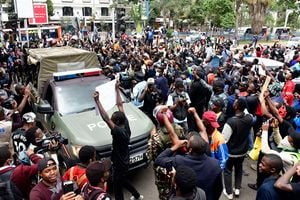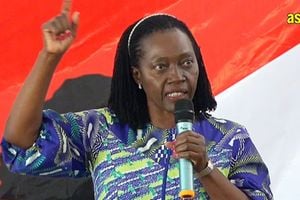
Harry Thuku. He started the Young Kikuyu Association, the first African Political Party in Kenya.
About 100 years ago, the Young Kavirondo Association was formed to represent an angry generation that was opposed to punitive tax regimes. This emerged together with Harry Thuku’s Young Kikuyu Association, the first African Political Party in Kenya, which was agitating for the same.
I have heard Leader of Majority Kimani Ichungw’a say that for the ‘first time’, Kenyans are discussing taxes and budget. How wrong. Let me educate him: Taxes have been central to political organisation in Kenya, and he should not underestimate the power of the youth. Just check Harry Thuku’s age when he was deported for raising his voice against taxes 100 years ago. Just check Jonathan Okwiri’s age when he challenged taxation under the framework of the Young Kavirondo Association.
Looking at Gen Z and the anger that they have exhibited in the last week against Zakayoism, one can see the parallels between colonial thinking and the modern-day Ruto tax regime. Both have sent police to enforce tax collection. The Harry Thuku Riots of 1923 would still mimic Ruto's brutality against a harmless Gen Z, whose only crime was to mobilise and speak up in a silenced political terrain.
Ichungw’a should also read the origins of the Young Kavirondo Association, aka ‘Piny Owacho’. This movement was a whirlwind – and the colonial government had to seek a formula to stop it. For Ichungw’a – and others of his ilk – the Young Kavirondo was agitating against the Hut and Poll Tax and demanded the end of forced labour. While they rose against the economic burden, some wanted to retain the shackles - especially the Catholic Church – reasoning that the removal of the Hut Tax might discourage the practice of polygamy.
Busybodies
Right now, we have some MPs, some ne'er-do-wells, and busybodies who support excessive taxation, arguing that the money would lead to better services. They are against Gen Z political demands—like the Church Missionary Society was in 1923 when Young Kavirondo emerged.
One lesson that Gen Z should learn from Young Kavirondo is that their quest for change might be sabotaged if they entertain the wrong people in their midst. The YKA's lethargy collapsed when they were duped to accept Archdeacon Walter E. Owen, a white missionary, as their President. Archdeacon Owen depoliticised YKA and created the harmless Kavirondo Taxpayers Welfare Association he headed. As Oginga Odinga put it in his book Not Yet Uhuru, "Owen blunted the sword of this political movement and diverted it to welfare channels." It is true.
Since colonial times, there has been an old tactic when the youth agenda was used to justify budget corruption. You have heard of 'Kazi kwa Vijana, Kazi Mtaani, and National Youth Service, which have been used as schemes to divert youth's attention from national debates. Carpetbaggers also use it to skim money from the treasury. The diversion of attention is not new.
During Archdeacon Owen's time, after he took over the Young Kavirondo Association, he diverted the youth's attention to planting trees, digging pit latrines, and manufacturing hand mills to grind maise and hygiene. He also brought on board colonial chiefs to serve as ex-officio vice-presidents, and that is how Owen helped restrain Nyanza youth, silence them on taxes, and weaken the political mobilisation. It would then take the generation of Oginga Odinga, in their 20s, to challenge the status quo.
The twenties and thirties were a magic age. It was the same age that Harry Thuku was arrested and deported after the 1923 riots in Nairobi as he championed an end to new taxation measures. Apparently, in 1920, the colonial government introduced a new tax, collected twice a year, to, ostensibly, bridge a budgeting gap after World War I. Thuku’s response the Young Kikuyu Association. If MPS think that Gen Z is too young to participate in politics, they should check the books of history. They will find out that Jomo Kenyatta was in his early 30s when he left to present petitions in Westminister and was in his 20s when he became the Secretary General of Kikuyu Central Association.
As it is happening within Gen Z, which has used social media to create new voices, the Young Kavirondo Association and Young Kikuyu Association created a space where colonial taxation could be challenged—the same way Gen Z has now forcefully taken up an agenda that was hitherto the preserve of politicos who behave like colonial masters.
Angry generation
Why is there always an angry generation? History shows that at every stage of oppression, there emerges an angry generation that causes a revolution. We saw the Mau Mau generation that was dismissed as "terrorists" but forced the colonial government to abandon the "White Man's Country" project.
When you look back, 100 years ago, it appears that we have not learnt any lessons. People get annoyed when their taxes are utilised for mundane tasks or to support corruption networks. Let me give an example that may have been forgotten. The taxes that the pioneer Young Kavirondo and Young Kikuyu opposed were to, among other things, pay for loan liabilities that included an annual rent of £17,000 of the Coastal Strip of Kenya, which was being paid to the Sultan of Zanzibar. He was further demanding £200,000 for his buildings at the 10-mile Coastal Strip of Kenya – which he regarded as his possession.
The Kenyans were also to pay an extra £250,000 if the Sultan agreed to "sell" the coastal strip to become part of the Kenya Colony. It was that kind of Zakayoism that would see Kenyans pay more. There was also the £17,205,600 loan which had been taken – without our approval – for the building of the Kenya-Uganda Railway and its associated harbours. Apparently, the loan had ceased to be a British problem and turned into a colony debt.
We have picked from this history of bad manners in managing public finances. I recently chanced on a 1936 report on a commission appointed to enquire into the report on the financial position and taxation system in Kenya. The report highlights some of the "lavish expenditures" occurring amidst a depressed economy. If you think President William Ruto's obsession with buildings has no history, look at this: "The expenditure on communications requires no special comment, but that on buildings appears to have been on a lavish scale considering the resources and taxable capacity of the Colony."
Gen Z have raised concern over the Office of the President's expenditure, especially in President Ruto and Gachagua's offices. The bad manners and wastage are historical if you look at that report critically. For instance, out of the £588,000 set aside to house government servants, “£75,460 was spent on Government House (Now State House, Nairobi), and £20,916 on Government House, Mombasa”. This means that 6 per cent of the total housing budget for that year was spent by the Colonial State House – the residence of the Governor. It is the same trend we see in Kenya, where Gen Z has questioned the allocation of hundreds of millions to Rachel Ruto and Pastor Dorcas Gachagua to finance their divinity activities. Again, more than Sh1 billion has been budgeted to refurbish Rigathi Gachagua's Harambee Annex and his Karen Office. Another Sh1.4 billion was allocated for the "refurbishment" of the State House. We can go on, ad infinitum.
Gen Z's point is that Zakayoism, the art of extracting taxes and budgeting corruption, will find a ready generation that organises differently. Colonialism first faced the Koitalel Samoei, Waiyaki wa Hinga, and Harry Thuku generation. They would later try to stop the Mau Mau to no avail. Another young generation forced Independent Kenya to go back to multi-party democracy, challenging both the Kenyatta and Moi regimes till a new Constitution was realised.
Today, another generation has emerged from the ashes of yesteryear generations. Dismiss them at your peril. Once upon a time, Permanent Secretary and Head of Civil Service Prof Philip Mbithi called us “hooligans” and "drunken youth" for attending the Saba Saba rally. Need I say more?
[email protected] @johnkamau1








